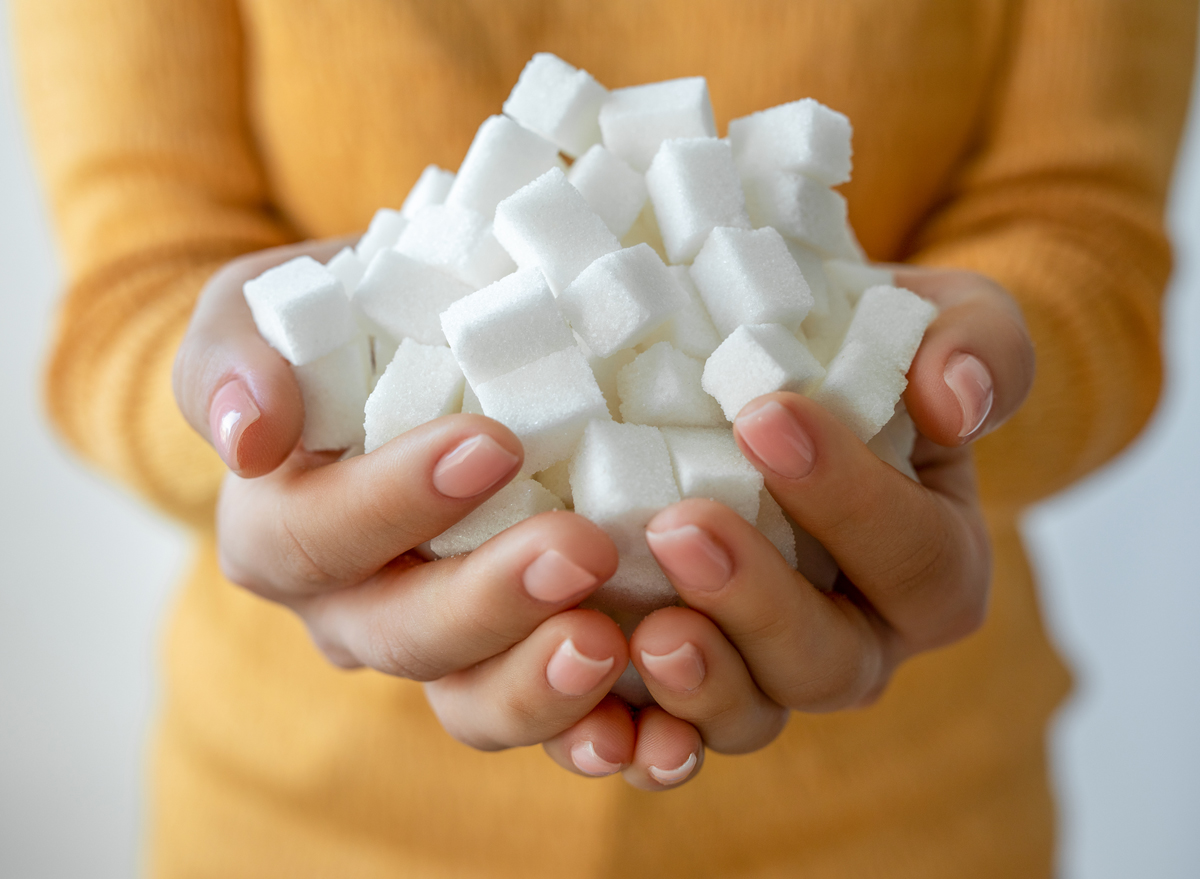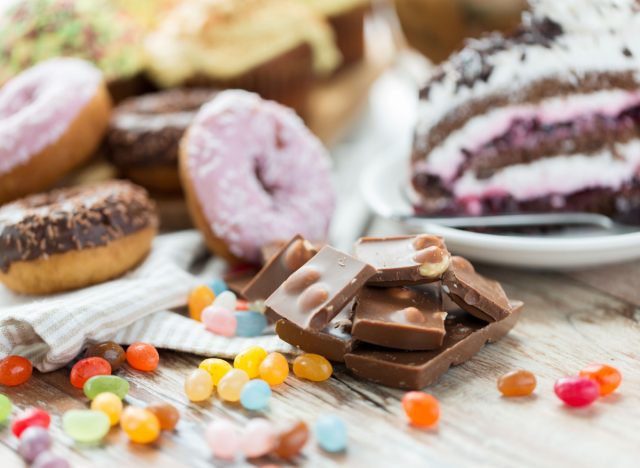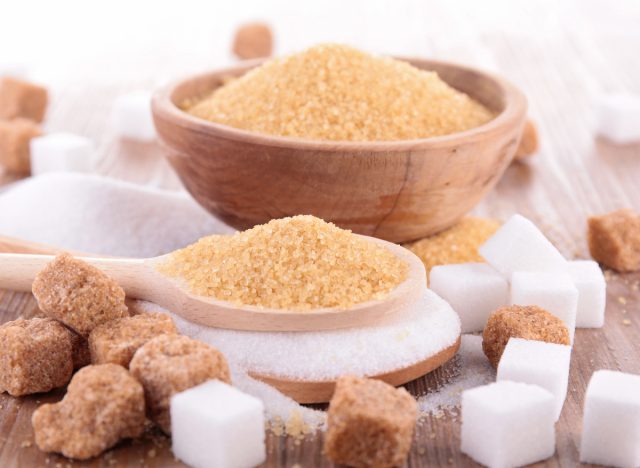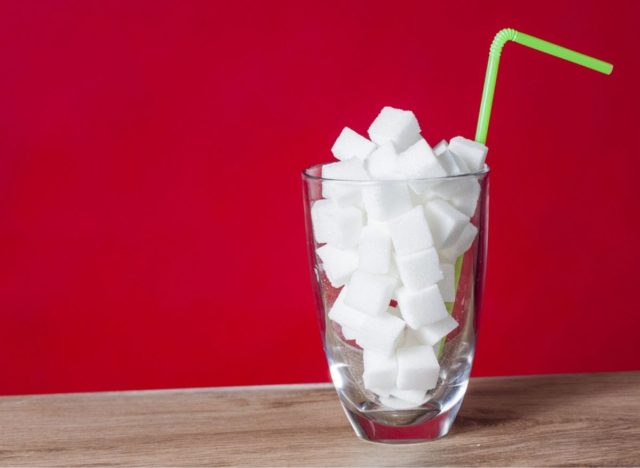7 Warning Signs You’re Eating Too Much Sugar

Sugar is one of life’s sweetest pleasures, but eating too much sugar can lead to hidden health consequences. While indulging in sugary treats occasionally is perfectly fine, regularly consuming too much sugar may have serious negative effects on your body. So, what are the signs that you’re eating too much sugar?
To understand sugar’s impact on your health, it’s important to define what “too much” actually means. “The American Heart Association recommends that women limit their daily added sugar intake to no more than 25 grams (6 teaspoons) and men to 37.5 grams (9 teaspoons),” says Amy Goodson, MS, RD, CSSD, LD.
Eating more than these recommended daily limits on occasion will likely not have too many side effects, but research has found that consistently eating too much sugar has been linked to chronic inflammation, heart disease, type 2 diabetes, and disruptions in your gut microbiome that can harm your overall health.
“It’s important to be mindful of your sugar intake and try to limit the consumption of added sugars in your diet,” says Goodson. Fortunately, your body often provides warning signs when you’re consuming too much sugar, allowing you to make adjustments before more serious health issues arise.
Here’s a closer look at some of the signs that you may be eating too much sugar and what they mean for your health. For tips on cutting back, check out 10 Ways to Break Your Sugar Addiction—For Good.
7 Signs You’re Eating Too Much Sugar
- You're constantly craving sugar.
- Your energy levels have been fluctuating.
- You might be experiencing dental problems.
- You've gained weight.
- You may be experiencing chronic pain.
- You may constantly feel hungry.
- You may have high blood pressure.
You’re constantly craving sugar.

“If you find yourself constantly craving sugary foods or drinks, it may be a sign that you’re consuming too much sugar,” says Goodson. She explains that “high sugar intake can lead to a cycle of cravings and overconsumption due to blood sugar spikes and crashes.”
This cycle happens because consuming foods high in sugar but lacking digestion-slowing nutrients like fiber or protein causes your blood sugar to spike quickly—and then crash.
This process is measured by the Glycemic Index (GI), which rates how fast a food raises blood sugar levels. High-glycemic foods, like candy, soda, donuts, and muffins, cause rapid spikes, leading to more cravings. On the other hand, low-glycemic foods, such as vegetables, whole grains, and legumes, contain fiber that slows absorption, helping to stabilize blood sugar levels.
In short, eating high-sugar foods can leave you craving more, making it difficult to break the cycle.
Your energy levels have been fluctuating.

Speaking of blood sugar crashes, another symptom you may experience after eating too much sugar is fluctuations in your energy levels—which can be caused by rapid spikes in blood sugar levels.
“A diet high in sugar can lead to energy spikes and crashes, and if you experience frequent energy fluctuations, feeling hyperactive and then suddenly fatigued, it could be due to excessive sugar consumption,” says Goodson.
To combat these fluctuations, Goodson suggests balancing meals by “pairing a high-fiber carbohydrate, like whole grains or fruit, with some protein.” Protein slows digestion and helps stabilize blood sugar, giving you sustained energy throughout the day.
You might be experiencing dental problems.

If your oral health is suffering, sugar could be the culprit.
“Sugar is a primary contributor to tooth decay and cavities, so if you’re experiencing frequent dental issues, it could be a sign of excessive sugar consumption,” says Goodson.
Research from Frontiers in Oral Health says that excess sugar consumption is the number one cause of dental cavities. When mouth bacteria metabolize sugar, they produce acid that weakens tooth enamel, leading to decay, according to the World Health Organization.
You’ve gained weight.

If you’re eating too much sugar regularly, you may notice that you’re gaining weight.
“Notice a higher number on the scale? It could be because you’re eating too much sugar,” says Courtney D’Angelo, MS, RD, a registered dietitian and author at Go Wellness. “High sugar can disrupt metabolism and can damage the ecosystem of our gut microbiome, which regulate blood glucose and insulin levels.” In other words, “the more sugar you eat, the more your body thinks it needs, which makes you more hungry, [and may lead to] weight gain.”
Additionally, sugary foods are often “empty calories,” meaning they provide energy but lack essential nutrients. “Products with added sugar are higher in calories and lower in nutrient quality, which, when consumed often, can result in weight gain,” says Trista Best, MPH, RD, LD at Balance One Supplements.
You may be experiencing chronic pain.

Consuming too many sugary foods and drinks consistently can lead to chronic pain.
“Your chronic pain and stiffness may be the result of consuming too much added sugar,” adds Best. “This is due to the inflammation that added sugar causes in the body because it is a highly inflammatory ingredient.”
A review published in the Journal of Clinical Medicine found that too much fat and sugar may lead to increased chronic pain in osteoarthritic patients. Another report published in Frontiers in Nutrition says that added sugar is “an accomplice of inflammation” and therefore can contribute to chronic pain.
You may constantly feel hungry.

Sugary foods are known for leaving you feeling hungry, so it’s important to notice how satiated you feel after a meal.
Sweets are generally high in calories, but they lack real nutrients like protein, fiber, and healthy fats. This causes your body to burn through it quickly, leaving you hungry and prone to “compulsive snacking, mindless eating, and ultimately, [seeking out] more sugar,” says D’Angelo.
High amounts of sugar can also interfere with a hormone in our body called leptin, which is known for regulating hunger. A decrease in leptin levels commonly leads to more hunger and an increase in appetite.
Goodson adds that starting your day with a high-sugar breakfast can set you up for hunger before lunch. “To combat this, choose a high-fiber carbohydrate at breakfast like oatmeal or whole grain toast and pair it with protein like eggs or Greek yogurt. The fiber and protein will help you stay fuller longer after breakfast.”
You may have high blood pressure.

Lastly, eating too much sugar may contribute to increased blood pressure levels in some people.
A study published in Nutrients found that there was a strong link between increased added sugar intake and higher levels of blood pressure in participants between 65-80 years old.
“If you’ve noticed an increase in your blood pressure, you may be consuming too much added sugar,” says Best. “Added sugar raises uric acid in the body, which in turn inhibits nitric oxide production.” Nitric oxide keeps blood vessels flexible, and without it, blood pressure can rise.
- Source: https://www.nature.com/articles/s42255-021-00383-x
- Source: https://www.sciencedirect.com/science/article/pii/S2588930320300037
- Source: https://www.ncbi.nlm.nih.gov/pmc/articles/PMC9020561/
- Source: https://www.who.int/news-room/fact-sheets/detail/sugars-and-dental-caries
- Source: https://www.ncbi.nlm.nih.gov/pmc/articles/PMC7141322/
- Source: https://www.ncbi.nlm.nih.gov/pmc/articles/PMC9471313/
- Source: https://www.ncbi.nlm.nih.gov/pmc/articles/PMC3627933/
- Source: https://www.ncbi.nlm.nih.gov/pmc/articles/PMC3649097/
- Source: https://www.ncbi.nlm.nih.gov/pmc/articles/PMC6770020/









